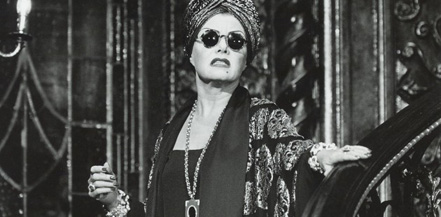A-List: Five Best Movies About Los Angeles
By J. Don Birnam
June 4, 2015
3. Mulholland Drive (2001)
Landing the third spot is a movie that showcases another thing that films about La La Land seem to feature that you don’t really see in New York movies: street or neighborhood titles in their names. The roadways are, of course, a key part about what makes Los Angeles. And in the eponymous Mulholland Drive, David Lynch’s psycho-sexual thriller that introduced Naomi Watts to the world, the twists and hallucinations are seconded only by the subtle yet undeniable analogies to the city itself.
Mulholland Drive was part of a mini-wave of new American cinema in the early 2000s that featured other dark entries about the abyss that is the human mind (think Memento and Requiem for a Dream). It tells the eerie story of two women caught in a confusing web, apparently fueled by amnesia. The movie itself is subject to countless interpretative theories: is it all a dream? Is it the figment of one of the women’s imagination? Are both of them real? Is the movie told in an endless loop, like time itself?
Regardless of whether one can reach for an answer to these questions, all can agree (for the director said so himself) that this is a movie about broken dreams in Hollywood and the horrid (yes, horrid) nature of those dreams. Mulholland Drive towers over the City as a beacon of tragedy, confusion, and pain itself. Lynch deftly portrays the evil he perceives in the Hollywood machine through the evil of the characters in this already-landmark film. In the end, Mulholland Drive, like all great L.A. movies, leaves you both horrified at Los Angeles, and, in some sickly perversion, affirmatively wanting more. Indeed, as with L.A. Confidential, this movie makes one thing very clear: falling for the seductive power of sex is falling for Los Angeles’ seductive power, and in that weakness of the flesh lies your undoing.
2. Sunset Boulevard (1950)
With all respect to Mr. Lynch, however, it is clear as day that he took his cues from Billy Wilder’s masterpiece (and that’s saying a lot), Sunset Boulevard, which today takes the number two spot (and gives Mr. Wilder two entries in each of the last two A-List columns).
Again deftly named for a key roadway in Los Angeles, Sunset Boulevard is perhaps the great-granddaddy of many if not all of the movies I’ve listed here. Readers paying attention would have guessed, given the opening line of this column, that this movie would make an appearance on the list. Deservedly so, because it captures perfectly the Los Angeles of its day and the timelessness of its spirit. Even noted gossip columnist of the time, Hedda Hopper, makes an appearance in this film that cynically portrays the cold nature of Hollywood, the cruel process by which it discards aging stars, thus killing the very dreams they’ve helped create in others. Of course, those others, the audience, themselves care little about aging stars, becoming unwitting accomplices of this dastardly cycle of success and fame followed by obscurity and oblivion.
That year, another angst-filled movie wowed critics and juries alike, as All About Eve took Hollywood by storm. Perhaps the Academy could not fathom to reward a film that skewered its own livelihood, and opted to instead recognize one that skewered New York’s (the theater), but the themes of the two are so interconnected (and Sunset arguably the better movie) as to make this the actual winner in my eyes. Few movies illustrate the hope and eventual disillusionment, and the (at times shocking, disturbing, but like reality TV today, alluring and fascinating) tragedy that Los Angeles can entail.
In any event, few movies capture the spirit of Los Angeles, and a true Los Angeles movie, as Sunset Boulevard does, except perhaps for…
1. Chinatown (1974)
In the top spot, in a squeaker, has to be Roman Polanski’s Chinatown. By now, it should be clear that the overarching style of Los Angeles movies is film noir, and the overarching themes are sex, corruption, crime, and murder. And this movie has it in droves.
As disturbing and frigid as some of the scenes are in many of the movies I have listed here, they are twice over in Chinatown. Jack Nicholson plays a disaffected cop on the trail of a political corruption scandal involving the county’s water supplies. Faye Dunaway is the wife of the man Nicholson was originally hired to investigate, and she is seductive, mysterious, and seemingly dangerous (of course).
The story weaves complexly in and out of Los Angeles landmarks and characters and, like the others, features shocking and cruel twists and surprises, including disturbing imagery involving Dunaway’s character’s past, and her denouement.
Chinatown is, bar none, a brilliant movie. It represents the pinnacle of American moviemaking in the golden decade of the 1970s. It features timeless performances and unforgettable revelations. It captures the loneliness of the time, and of its city. And it delivers, swiftly, a clear message: by the end of the movie, it becomes horrifically clear, as in the end of all the movies on this list, that for all its radiant beauty, its endless sun, and its beautiful peoples, Los Angeles is viewed, at least by those who control its primary industry, as a sinister, unforgiving, and even dangerous place. It sounds like New York, but it’s not.
It’s Chinatown, Jake.
Continued:
1
2
3
|
|
|
|




